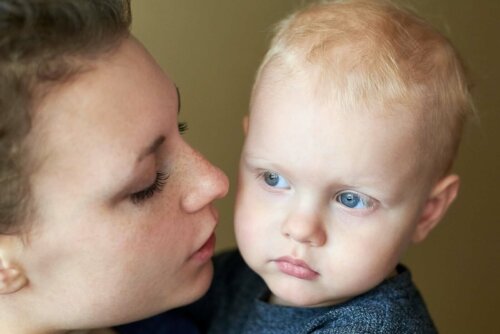How to Talk to Children: What You Should Know


Written and verified by the psychopedagogue María José Roldán
There are times when parents change their tone of voice when talking to their children. Even when children are a little older, they use this childish tone of voice to talk with them. It’s actually not necessary to use this way of speaking in order to connect with children. So, below, we’re going to tell you all about how to talk with children.
You always have to take into account the type of message or words that children are capable of processing. Talking to a 12-year-old isn’t the same as talking to a 7- or 4-year-old. It’s important to keep this in mind so you know how to talk to children at any given time.
How to talk to children: why is conversation better?
Talking to your baby or toddler can help develop their language and communication skills. The more you talk to your baby, the better. This is because parents who talk to their little ones use many different sounds and words.

When children hear a wide variety of words, they improve their understanding of language. It also increases the number and variety of words they understand and use; it’s not just about better language skills. Talking to babies helps their brains develop and improve in school when they’re older.
What kinds of conversations are good for babies and toddlers?
Talking to young children doesn’t have to be a big problem. You can talk to your child about spending time washing, preparing meals, or whatever is going on around you. For example, you’re outside with your child and he points to a tree. You might say: “It’s a big, huge tree, isn’t it? I wonder what kinds of animals live in it. Maybe a squirrel?”
How much should we talk to young children?
Any conversation is good for your baby or toddler, so try to talk as much as you can during the day. You don’t need to create a special moment for this.
Babies and toddlers also like quiet time, so if your child stops responding to you and begins to look tired, fussy or grumpy, simply choose another time of day to talk.
Your child’s temper can also affect how often they want to communicate with you. Some babies and toddlers are naturally more outgoing, and others are calmer. This is something that one must respect, as a parent.
When to start talking to babies?
As soon as possible! In fact, right after birth, your baby starts absorbing a great deal of information about words and speech just by listening to you and watching you speak. However, conversations with your baby may seem one-sided in the beginning.
Even though your baby is still at a loss for words, they’ll be listening to you and trying to join in on the conversation. They’ll use crying, eye contact, and listening to communicate. Later your baby will smile, laugh, make more sounds, and move their body to try to talk to you.
If you pay close attention when you’re talking, you’ll notice this early conversation and communication from your baby. By communicating back a forth with your child in a warm and friendly way, you’re creating and sharing experiences with them. This strengthens your relationship with your little one and helps them learn more about the world at the same time.
Tips for talking to babies and young children
You may feel weird talking to a baby or toddler who doesn’t talk much, but keep it up. The conversations and activities below are great for developing your child’s language skills.
Tune in to your child
Reduce distractions. Turn off the TV and computer. Try to be truly “there” and present when talking to your child. Also:
- See what your child’s interests are. Ask them questions or make comments and give them time to respond.
- As your toddler learns to speak, give them time to find words for their ideas, and actually listen when they speak. For example, try not to finish sentences for them and make sure they’re finished before you start speaking. This will send a message to your little one that what they have to tell you is important.
- Use natural words. Your child will complete a few pauses when developing language. This will help you speak and listen in conversation.

How to talk to children: Show interest
Talk to your child about the things that interest them, even if you don’t like it very much. Also:
- Talk about an experience you shared together.
- Use face and body expressions a lot to make the conversation more interesting and engaging. What you talk about doesn’t matter as much as how you talk about it.
- If you use complex words, explain and expand on them using many descriptive words. For example, “We’re going to see the pediatrician, who is a special doctor that knows everything about babies and children.”
Read, tell stories, sing songs, and rhyme
Read books and tell stories to your baby from birth, every day if you can. After a few weeks, your little one will know that reading together is a special time for both of you. Also:
- Talk about the pictures you see in books.
- Help your child learn that books and reading are fun. Ideally, have a special reading place at home
- Sing songs and rhymes at any time, your baby or toddler will love the rhythm of words and the tone of your voice.
In short, we hope that you’ll soon put these tips into practice when talking to children. They’ll help you strengthen your bond and it will be a wonderful experience for both of you!
There are times when parents change their tone of voice when talking to their children. Even when children are a little older, they use this childish tone of voice to talk with them. It’s actually not necessary to use this way of speaking in order to connect with children. So, below, we’re going to tell you all about how to talk with children.
You always have to take into account the type of message or words that children are capable of processing. Talking to a 12-year-old isn’t the same as talking to a 7- or 4-year-old. It’s important to keep this in mind so you know how to talk to children at any given time.
How to talk to children: why is conversation better?
Talking to your baby or toddler can help develop their language and communication skills. The more you talk to your baby, the better. This is because parents who talk to their little ones use many different sounds and words.

When children hear a wide variety of words, they improve their understanding of language. It also increases the number and variety of words they understand and use; it’s not just about better language skills. Talking to babies helps their brains develop and improve in school when they’re older.
What kinds of conversations are good for babies and toddlers?
Talking to young children doesn’t have to be a big problem. You can talk to your child about spending time washing, preparing meals, or whatever is going on around you. For example, you’re outside with your child and he points to a tree. You might say: “It’s a big, huge tree, isn’t it? I wonder what kinds of animals live in it. Maybe a squirrel?”
How much should we talk to young children?
Any conversation is good for your baby or toddler, so try to talk as much as you can during the day. You don’t need to create a special moment for this.
Babies and toddlers also like quiet time, so if your child stops responding to you and begins to look tired, fussy or grumpy, simply choose another time of day to talk.
Your child’s temper can also affect how often they want to communicate with you. Some babies and toddlers are naturally more outgoing, and others are calmer. This is something that one must respect, as a parent.
When to start talking to babies?
As soon as possible! In fact, right after birth, your baby starts absorbing a great deal of information about words and speech just by listening to you and watching you speak. However, conversations with your baby may seem one-sided in the beginning.
Even though your baby is still at a loss for words, they’ll be listening to you and trying to join in on the conversation. They’ll use crying, eye contact, and listening to communicate. Later your baby will smile, laugh, make more sounds, and move their body to try to talk to you.
If you pay close attention when you’re talking, you’ll notice this early conversation and communication from your baby. By communicating back a forth with your child in a warm and friendly way, you’re creating and sharing experiences with them. This strengthens your relationship with your little one and helps them learn more about the world at the same time.
Tips for talking to babies and young children
You may feel weird talking to a baby or toddler who doesn’t talk much, but keep it up. The conversations and activities below are great for developing your child’s language skills.
Tune in to your child
Reduce distractions. Turn off the TV and computer. Try to be truly “there” and present when talking to your child. Also:
- See what your child’s interests are. Ask them questions or make comments and give them time to respond.
- As your toddler learns to speak, give them time to find words for their ideas, and actually listen when they speak. For example, try not to finish sentences for them and make sure they’re finished before you start speaking. This will send a message to your little one that what they have to tell you is important.
- Use natural words. Your child will complete a few pauses when developing language. This will help you speak and listen in conversation.

How to talk to children: Show interest
Talk to your child about the things that interest them, even if you don’t like it very much. Also:
- Talk about an experience you shared together.
- Use face and body expressions a lot to make the conversation more interesting and engaging. What you talk about doesn’t matter as much as how you talk about it.
- If you use complex words, explain and expand on them using many descriptive words. For example, “We’re going to see the pediatrician, who is a special doctor that knows everything about babies and children.”
Read, tell stories, sing songs, and rhyme
Read books and tell stories to your baby from birth, every day if you can. After a few weeks, your little one will know that reading together is a special time for both of you. Also:
- Talk about the pictures you see in books.
- Help your child learn that books and reading are fun. Ideally, have a special reading place at home
- Sing songs and rhymes at any time, your baby or toddler will love the rhythm of words and the tone of your voice.
In short, we hope that you’ll soon put these tips into practice when talking to children. They’ll help you strengthen your bond and it will be a wonderful experience for both of you!
All cited sources were thoroughly reviewed by our team to ensure their quality, reliability, currency, and validity. The bibliography of this article was considered reliable and of academic or scientific accuracy.
- Nelsen, J,. (2007) Cómo educar con firmeza y cariño. Editorial: Medici
This text is provided for informational purposes only and does not replace consultation with a professional. If in doubt, consult your specialist.








